Jumoke Verissimo is a Nigerian poet, novelist, children's writer and critic.
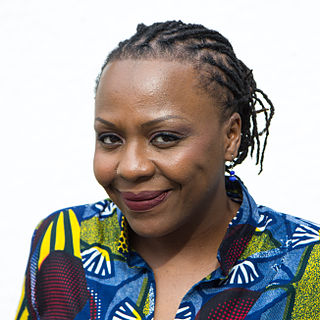
Lola Shoneyin is a Nigerian poet and author who launched her debut novel, The Secret Lives of Baba Segi's Wives, in the UK in May 2010. Shoneyin has forged a reputation as an adventurous, humorous and outspoken poet, having published three volumes of poetry. Her writing delves into themes related to female sexuality and the difficulties of domestic life in Africa. In April 2014 she was named on the Hay Festival's Africa39 list of 39 Sub-Saharan African writers aged under 40 with potential and talent to define trends in African literature. Lola won the PEN Award in America as well as the Ken Saro-Wiwa Award for prose in Nigeria. She was also on the list for the Orange Prize in the UK for her debut novel, The Secret of Baba Segi's Wives, in 2010. She lives in Lagos, Nigeria, where she runs the annual Aké Arts and Book Festival. In 2017, she was named African Literary Person of the Year by Brittle Paper.

The 9mobile Prize for Literature was created by Etisalat Nigeria in 2013, and is the first ever pan-African prize celebrating first-time African writers of published fiction books. Awarded annually, the prize aims to serve as a platform for the discovery of new creative talent out of the continent and invariably promote the burgeoning publishing industry in Africa. The winner receives a cash prize of £15,000 in addition to a fellowship at the University of East Anglia.
Tade Ipadeola is a Nigerian poet who writes in English and Yoruba. He is a practising lawyer. In 2013 his poetry collection The Sahara Testaments won the prestigious Nigeria Prize for Literature instituted by the Nigeria Liquified Natural Gas (NLNG). In 2009, he won the Delphic Laurel in Poetry for his Yoruba poem "Songbird" at the Delphic Games in Jeju, South Korea.
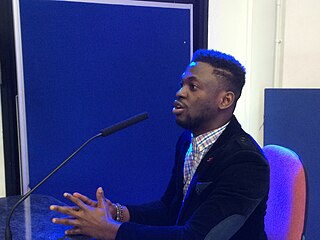
Echezonachukwu Chinedu Nduka is a Nigerian poet, pianist, author, recording artist, and ethnomusicologist specializing in piano music by West African composers. His work has been featured on BBC, Radio Nacional Clasica de Argentina, Radio France International (rfi), and Classical Journey.
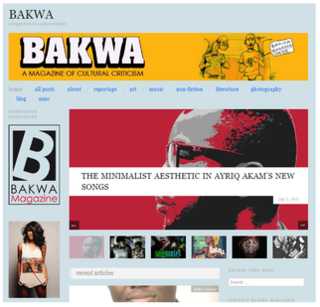
Bakwa is an online and print literary magazine based in Yaoundé, Cameroon. First published in 2011, it has been described as "an eclectic, intelligent take on the dynamic cultural scenes often missed by mainstream, western media". Notable contributors include: Imbolo Mbue, Kangsen Feka Wakai, Jeremy Klemin, Serubiri Moses, Minna Salami, Jack Little, Emmanuel Iduma, Bwesigye bwa Mwesigire and Johnnie MacViban.

Kọ́lá Túbọ̀sún is a Nigerian linguist, writer, translator, scholar, and cultural activist. His work and influence span the fields of education, language technology, literature, journalism, and linguistics. He is the recipient of the 2016 Premio Ostana "Special Prize" for Writings in the Mother Tongue for his work in language advocacy. He writes in Yoruba and English, and is currently the Africa editor of the Best Literary Translations anthology, published by Deep Vellum.

The Aké Arts and Book Festival is a literary and artistic event held annually in Nigeria. It was founded in 2013 by Lola Shoneyin, a Nigerian writer and poet, in Abeokuta. It features new and established writers from across the world, and its primary focus has been to promote, develop, and celebrate the creativity of African writers, poets, and artists. The Aké Arts and Book Festival has been described as the African continent's biggest annual gathering of literary writers, editors, critics, and readers. The festival has an official website and a dedicated magazine, known as the Aké Review.
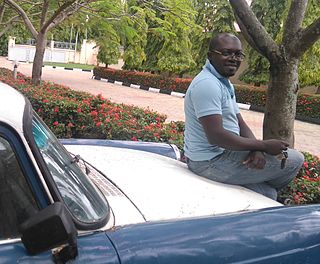
Richard Ali is a Nigerian writer, lawyer and co-founder of Parrésia Publishers, a Lagos-based Afri-centric publishing house, home to Helon Habila, Onyeka Nwelue, Chika Unigwe and Abubakar Adam Ibrahim, other continental voices.
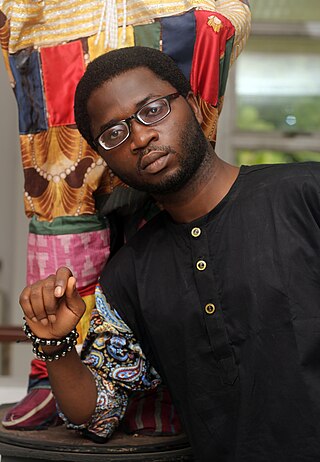
Ayo Sogunro is a Nigerian author, essayist and human rights lawyer. He is known for his work in social advocacy and for the protection of civil rights and the rights of sexual minorities in Nigeria. He was listed as one of the "100 Most Influential Nigerians" in 2017.

Ayọ̀bámi Adébáyọ̀ is a Nigerian writer. Her 2017 debut novel, Stay With Me, won the 9mobile Prize for Literature and the Prix Les Afriques. She was awarded The Future Awards Africa Prize for Arts and Culture in 2017.

Emmanuel Iduma is a Nigerian writer and art critic. He is the author of A Stranger's Pose (2018) and Farad (2012). In 2016, Farad was republished in North America as The Sound of Things to Come. He was awarded the inaugural Irving Sandler Award for New Voices in Art Criticism by the Association Internationale des Critiques d’Art, USA. He teaches in the MFA Art Writing Program at the School of Visual Arts, New York City.
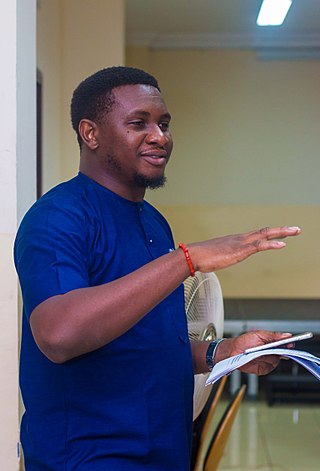
Dami Àjàyí is a Nigerian poet, medical doctor, essayist and music critic, described by Bernardine Evaristo as “a dexterous and versatile poet who flexes his linguistic muscles with surprising revelations that offer new perspectives as he illuminates the slips between memory and desire, family, community, and place.” He co-founded Saraba magazine in 2008. He is the author of three collections of poetry and a chapbook.
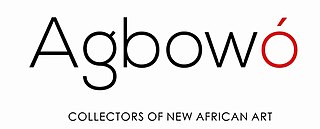
Agbowó is an African literary journal publishing poetry, fiction, essays, drama and visual art. The journal has published several works of literary and visual art since its launch in 2017 as well as three issues—X, Limits, Memory—of an annual, themed magazine.
Yinka Elujoba is a Nigerian writer, and editor who works as an art critic for The New York Times. He lives in Brooklyn, New York.

Stay with Me is a novel written by Nigerian author Ayọ̀bámi Adébáyọ̀. It was first published in 2017, by Canongate Books in the UK and subsequently by Alfred A. Knopf in the US.
Rasaq Malik Gbolahan is a Nigerian poet and essayist. With Ọ̀rẹ́dọlá Ibrahim, Malik is the co-founder of Àtẹ́lẹwọ́, the first digital journal devoted to publishing works written in the Yorùbá language. He was the founding Editor-in-Chief of Agbowó.













